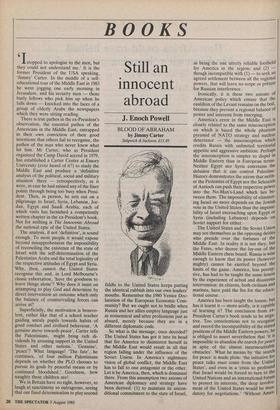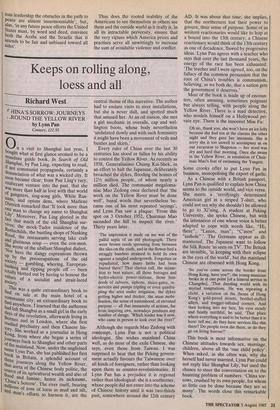BOOKS
'stopped to apologise to the men, but they could not understand me.' It is the former President of the USA speaking, 'Jimmy' Carter. In the middle of a self- educational tour of the Middle East in 1983 he went jogging one early morning in Jerusalem, and his security men — those burly fellows who pick him up when he falls down — knocked into the faces of a group of elderly Arabs the newspapers which they were sitting reading.
There is true pathos in the ex-President's observation, the essential pathos of the Americans in the Middle East, entrapped in their own conviction of their good intentions that others fail to recognise, the pathos of the man who never knew what hit him. Mr Carter, who as President organised the Camp David accord in 1979, has established a Carter Center at Emory University (ever heard of it?) to study the Middle East and produce a 'definitive analysis of the political, social and military situation' there — retrospectively, as it were, in case he had missed any of the finer points through being too busy when Presi- dent. Then, in person, he sets out on a pilgrimage to Israel, Syria, Lebanon, Jor- dan, Egypt and Saudi Arabia, each of which visits has furnished a competently written chapter in the ex-President's book. Not for nothing is The Innocents Abroad the national epic of the United States.
The analysis, if not 'definitive', is sound enough. To most people it would expose beyond misapprehension the impossibility of reconciling the existence of the state of Israel with the self-determination of the Palestinian Arabs and the total logicality of the respective attitudes of Egypt and Syria. Why, then, cannot the United States recognise this and, in Lord Melbourne's classic exhortation, 'have the goodness to leave things alone'? Why does it insist on attempting to play God and determine by direct intervention an outcome which only the balance of countervailing forces can arrive at?
Superficially, the motivation is benevo- lent, rather like that of a school teacher guiding unruly pupils towards habits of good conduct and civilised behaviour. 'A genuine move towards peace', Carter tells the Palestinians, 'might bring rich di- vidends by arousing support in the United States and other nations."Genuine', 'peace'? What language! 'The fate', he continues, 'of four million Palestinians depends on whether the PLO chooses to pursue its goals by peaceful means or by continued bloodshed.' Goodness, how naughty these children are!
We in Britain have no right, however, to laugh at sanctimony so outrageous, seeing that our fixed determination to play second
Still an innocent abroad
J. Enoch Powell
BLOOD OF ABRAHAM by Jimmy Carter Sidgwick & Jackson, 03.95 fiddle to the United States keeps putting the identical rubbish into our own leaders' mouths. Remember the 1980 Venice Dec- laration of the European Economic Com- munity? But we ought not to bridle when Russia and her allies employ language just as nonsensical and utter professions just as absurd, merely because they are in a different diplomatic code.
So what is the message, once decoded? The United States has got it into its head that for America to disinterest herself in the Middle East would result in all that region falling under the influence of the Soviet Union. In America's nightmare vision of global conflict, the Middle East has to fall to one antagonist or the other. Let it be America, then, which is dominant there. From this assumption two axioms of American diplomacy and strategy have been derived: (1) to maintain its uncon- ditional commitment to the state of Israel, as being the one utterly reliable foothold for America in the region; and (2) — though incompatible with (1) — to seek an agreed settlement between all the regional powers, that will leave no scope or pretext for Russian interference.
Ironically, it is these two axioms of American policy which ensure that the cauldron of the Levant remains on the boll, because they prevent a regional balance of power and interests from emerging. America's error in the Middle East is closely related to the same misconception on which is based the whole phantom pyramid of NATO strategy and nuclear deterrence — the misconception which credits Russia with unlimited tenitorial appetite and aggressive ambition. Perhaps the misconception is simpler to dispel in Middle Eastern than in European terms. Neither Egypt nor Syria entertains the delusion that it can control Palestine. History demonstrates the axiom that neith- er the Ptolemies of Egypt nor the Seleucids of Antioch can push their respective power into the No-Man's-Land which lies be- tween them. The impossibility of eliminat- ing Israel no more depends on the Jewish vote in the United States than the impossi- bility of Israel encroaching upon Egypt or Syria (including Lebanon) depends on Soviet support for either. The United States and the Soviet Union may see themselves as the opposing deities who preside over the fortunes of the Middle East. In reality it is not they, but the Fates, who decree the lay-out of the Middle Eastern chess board. Russia is wise enough to know that its power (however mighty) cannot be exerted beyond the limits of the game. America, less percer five, has had to be taught the same lesson by the experience of actual and disastrous intervention: its citizens, both civilians and marines, have paid the fee for the educa- tional course.
America has been taught the lesson, but has it learnt it — more acidly, is it capable of learning it? The conclusion from ex- President Carter's book tends to be nega- tive. Too conscientious not to recognise and record the incompatibility of the stated positions of the Middle Eastern powers, he is obliged to assert nevertheless that 'it is impossible to abandon the search for peace in spite of the almost insurmountable obstacles'. What he means by 'the search for peace' is made plain: 'the initiative for peace talks must come from the United States', and even in a 'crisis so profound that Israel would be forced to turn to the United Nations and an international foruni to protect its interests, the deep involve- ment of the United States would be man- datory for negotiations.' Without Amer' ican leadership the obstacles in the path to Peace are almost insurmountable'; but, alas, 'in any future peace efforts the United States must, by word and deed, convince both the Arabs and the Israelis that it intends to be fair and unbiased toward all Sides'. Thus does the rooted inability of the Americans to see themselves as others see them and the outside world as it really is, in all its intractable perversity, ensure that the very virtues which America prizes and practises serve all unwittingly to increase the sum of avoidable violence and conflict.











































 Previous page
Previous page